Game Rant speaks with Homeworld 3’s Andrew Oatway about the game’s space terrain and how it enables scenes like the famous Star Wars trench run.
Homeworld 3 is shaping up to be a worthy successor to the classic real-time space strategy series that redefined the genre back in 1999 with a number of new innovations. This time around, Homeworld 3 is building on the series’ iconic six-degrees-of-freedom strategy by introducing a variety of functional terrain. With surprising ease, players can order ships to hide behind asteroids, cut through trenches within hulking space wrecks, or even take cover behind the broken husks of recently destroyed enemy craft.
In an interview with Game Rant, Homeworld 3 Lead Designer Andrew Oatway talked about how he approached the game’s level design with this unique cover system in mind, particularly when it comes to the endlessly replayable multiplayer and singleplayer roguelike War Games mode. He felt that it was critical to design levels that had believable terrain features that could emphasize strategic gameplay by allowing for multiple approaches to the mode’s randomly generated mission objectives. Homeworld 3’s Cover System Is Both Cinematic and Strategically Meaningful
Although Homeworld and its sequel were revolutionary when it came to players’ freedom of movement through the games’ open levels, they lacked environmental features that might have encouraged more deliberate use of this unique verticality. Homeworld 3 has vastly improved on this shortcoming, populating levels with massive space hulks riddled with tunnels and angled surfaces that completely change the way players maneuver their fleets.
Home
United States
USA — software Homeworld 3 Lets Players Live Out Their Star Wars Trench Run Fantasies






